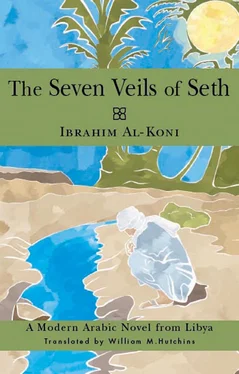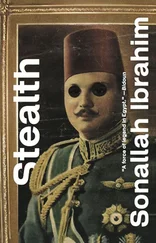The invalid whom they left alone, inside the tent, however, was not conscious of any whispered suggestion and did not feel any rout, because he required no medical expertise to realize that he had to summon all the strength he could muster to fight off the disease if he wished to stay alive. So he stretched out a trembling hand to seize a piece of bread they had left near him and struggled to chew it, not from hunger but because his ailing body needed nourishment to help it struggle against a disease. He swallowed a morsel with disgust. Then he undid the tie of the water skin that hung from the tent pole above his head and nursed from its mouth like a kid nursing from a goat’s teat. He took one sip and then refastened the tie, worried about exhausting the water. He knew he would perish from thirst even if he did not perish from the disease. His life now depended much more on the water in the skin than on the illness in his body. The tribes’ specialists who devised this stratagem understood this and therefore usually were stingy with a terminal patient’s water, because they were certain that plentiful water would only prolong his suffering. He moved slightly to check the sores on his face as the stink of purulence assailed his nose. He tried to stop his nostrils with the end of his veil, but it was enmeshed with his decomposing flesh and therefore difficult to pull off. It was, similarly, hard to free his garment, which was bonded to his body so tightly that it was no longer possible to distinguish cloth from flesh. The viscous purulence had coated and soaked the garment so that it adhered firmly to his carcass, even though the liquid had not dried yet. In fact, it continued to leak from his sores, flooding and flowing over the surface.
From the entrance wafted some breaths of noonday heat. He wished for an attack of the Qibli wind, which sucks up water from wells and even absorbs the dampness from water skins, leaving plants in the desert little more than desiccated waste and deadwood, no different from rocks and dirt. He wished for an assault from the south wind, which would effect the deliverance that thus far the disease had failed to provide. He attempted to open his eyes to see how light it was, but his stupor veiled the light, making night and day equivalent. He had lost the sense of sight but not his senses of smell or of touch, despite the frightful devastation to which the disease had exposed his body. He also experienced the fiery breaths of the desert via his ruined body, although he could not hear it howl across the wasteland or keen while struggling with the tent. He remained rigid, powerless, abandoned, waiting for a deliverance that did not come. He lost consciousness several times, although he knew he had not slept even for a moment. He began to lose his sense of time just as previously he had lost his sense of pain, but still deliverance did not come. He felt very thirsty but had reached a tipping point where drinking or feeling thirsty seem equivalent. He did not try to move his hand to unfasten the water skin because he felt nauseous. He was nauseated by his own body, which stank with the foulest odor in the whole desert: the smell of a body decomposing, the smell of a body festering, the smell of purulence.
He fell into a stupor again but before beginning this trip into altered consciousness made the wish never to return from this journey to the beyond, but. . But what the spirit world wishes is always different from what we wish. The spirit world wants to return us from a voyage to the beyond when we do not care to. The spirit world takes us on this journey, which we do not even want to make. Its justification is that it provides us with a form of deliverance on each of these trips.
This time, too, the spirit world laid the type of snare that grows ever murkier the clearer we think it has become; this cunning strategist brought back to life this body, which was covered with sores and ulcers, by the hand of a messenger disguised in the rags of a wayfarer. He held tightly in his right hand the halter of a jenny, which trailed behind her a camel laden with his belongings, and his left hand grasped a prescription hidden in a fodder bag.
The jenny master bound his veil tightly around his nose, leaned over the inert body, and examined it for a long time. Once he had ascertained that maggots had yet to assail the body, which was awash in vile liquids, he straightened up and grumbled aloud, “Wherever there’s a putrid stink, there’s some plague. Wherever a plague holds sway, an oasis has played a part.” He removed his belongings from the pack animal and lit a fire in front of the tent. He took some herbs from the fodder bag and then selected from his belongings a container, which he filled with water. He steeped the pungent, grimlooking herb in the water and intoned a mournful song while waiting for the fire to transform the sticks to hot coals. From a stick he fashioned a poker with which he pushed aside the flaming logs. He then placed the earthenware vessel over the coals without pausing in his repetition of the mournful elegy. A traveler must sing. He sings even when nothing prompts him to sing, for — if he does not sing — he will speak, and the spoken word is what the traveler cannot bear, not because it is wrong for a solitary person to talk to himself, but because it distracts him from the wayfarer’s sole enjoyment, which is listening. Eavesdropping on the spirit world is impossible unless one listens carefully. Silence is the spirit world’s protective amulet that can only be foiled by adroit listening, for the desert’s sound is masked by other sounds and the desert’s sound is a prophecy. Prophecy is always located in a place beyond sound, in a place beyond place. Prophecy is the rambling man’s secret. Prophecy is the wayfarer’s goal. If he does not reach it through speech, he searches for it in silence. If he cannot attain it through silence, he circles its sanctuary by singing. For this reason, a wayfarer communicates through song, not words.
In the vessel, the herbal brew thickened and its color became even less appetizing. He removed the container from the fire pit and allowed time for the liquid to cool. From his kit he took out a wooden spoon marked with arcane symbols. He then carried his treasure to the body stretched out beside the tent pole. With difficulty he tore away the veil that had dried onto the victim’s face. He leaned the man’s head against his knee and started to feed him the disgusting liquid from the wooden spoon, which was decorated with talismans. He emptied the potion into the man’s belly, down to the last drop and then jumped up. Standing above the head of the prone body, he declared as if reciting a charm: “Now we shall see. Either you turn back or you proceed forward. Either way, you won’t lose much.” Then he left the tent and stood by its entrance, contemplating the eternal plain that spread to the four corners of the world; indeed its nakedness stretched all the way to the naked sky. There he sang another prophecy: “It’s not the disease that kills but the drug.”
He roamed across the plain. That evening, when he returned, he found the victim writhing in the tent, bickering with specters in an audible but indistinct voice. He raved for a long time in the language of the Unknown but finally said: “Fire! Fire! Fire!”
He continued to writhe as a new liquid oozed forth. This was not pus, purulence, or blood. It was disagreeable-looking too, but this liquid’s sharp scent was not that of pus or purulence. It was the scent of the suspect herb. He repeated again: “Fire! Fire! Fire in my belly!”
Tightening the veil around his nostrils first, he proceeded to examine his patient, on whose forehead he noticed beads of sweat. As this sweat coated the man’s whole body, the flesh started to liberate itself from the garment that had dried, adhering to the body’s flesh. He rejoiced in a loud voice: “Ha, ha. . I knew I wouldn’t succeed in saving the ailing body from destruction until I burned off its infected sweat.”
Читать дальше












